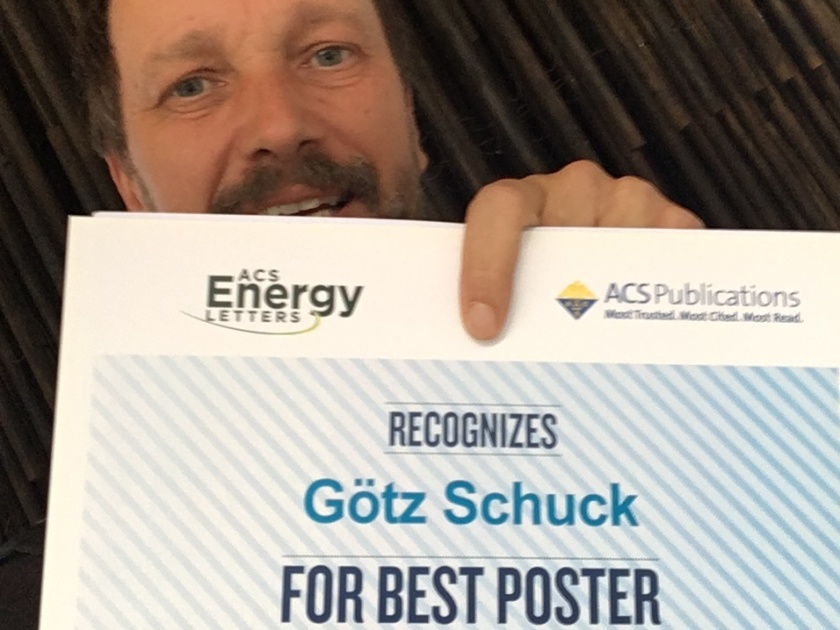Poster award for Götz Schuck

Dr. Götz Schuck was awarded a poster prize at the PSCO-19 © privat/HZB
At the 5th International Conference on Perovskite Solar Cells and Optoelectronics (PSCO-19) Dr. Götz Schuck received a prize for his poster contribution. The international conference took place from 30.09.2019 to 02.10.2019 in Lausanne, Switzerland.
Halide Perovskites are outstanding candidates for extremely efficient and yet cost-effective solar cells. In the most studied perovskite variant, the lattice sites of a perovskite structure are occupied by the halide element iodine, the metal lead and the organic molecule methylammonium. But what happens when iodine is replaced by chlorine?
Götz Schuck investigated this question using neutron scattering experiments and other methods. He presented the results on his poster titled "Influence of chloride substitution on the rotational dynamics of methylammonium in MAPb(I,Cl)3 perovskites".
"This award shows the high quality of Götz Schuck's research on the dynamic structure of halide perovskites", says Prof. Dr. Susan Schorr, head of the department Structure and Dynamics of Energy Materials. At the conference 150 posters have been presented, 7 of which were awarded with a poster prize.
red.
https://www.helmholtz-berlin.de/pubbin/news_seite?nid=20802;sprache=en
- Copy link
-
Helmholtz Doctoral Award for Hanna Trzesniowski
During her doctoral studies at the Helmholtz Centre Berlin, Hanna Trzesniowski conducted research on nickel-based electrocatalysts for water splitting. Her work contributes to a deeper understanding of alkaline water electrolysis and paves the way for the development of more efficient and stable catalysts. On 8 July 2025, she received the Helmholtz Doctoral Prize, which honours the best and most original doctoral theses in the Helmholtz Association.
-
New department at HZB: ‘AI and Biomolecular Structures’
Since 1 July 2025, Dr. Andrea Thorn has been setting up the new AI and Biomolecular Structures department at HZB. A biophysicist with many years of experience in AI-based tools for structural biology, she is looking forward to collaborating closely with the macromolecular crystallography team at the MX beamlines of BESSY II.
-
Almost 4,000 People at the Long Night of the Sciences at HZB
Helmholtz-Zentrum Berlin was delighted to welcome nearly 4,000 visitors to its Adlershof campus for the Long Night of the Sciences. It was a fantastic celebration of science, and we thank all our guests for their great interest.
